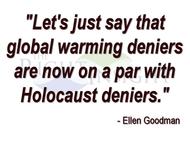How shall I call thee? “catastrophic anthropogenic climate change skeptic”
- By:
- Edward A. Reid Jr.
- Posted On:
- Jun 26, 2018 at 7:14 AM
- Category
- Climate Change
The consensed climate science community has been searching for the most effective epithet to use to refer to those who question their consensus regarding the human causation of climate change and the climate catastrophe they believe will result. However, until now, none of the epithets they have elected to use have had the desired effect of humiliating and isolating their intended victims.
The most accurate term for describing those who question the consensus is skeptics. Some are skeptical that CO2 and other “greenhouse gases” are the cause of the recent climate warming. Others are skeptical that those gases are a significant cause of the current warming. Yet others are skeptical that the recent warming would lead to a climate catastrophe. Their skepticism is reasonable, since there is no observational evidence to support the assertions of which they are skeptical.
There is clear paleoclimatic evidence that global climate changed, both warming and cooling, prior to the existence of instrumental measurements of temperature and other aspects of climate; and, prior to the period in which human emissions of CO2 and other ”greenhouse gases” were sufficient to have any measurable influence on global climate. There is also clear instrumental evidence that global climate has changed, both warming and cooling, since the advent of instrumental records. There is, however, no observational evidence which permits measurement of the fraction of these changes which is the result of human activity, whether emissions or land use changes.
There is also clear evidence in the instrumental temperature record of the persistence of natural changes in climate, particularly temperature. The rapid increases and decreases in global average temperature anomalies resulting from El Nino and La Nina events are perhaps the strongest evidence of the persistence of natural variation. The effects of longer time scale variations, such as the reversals of the Pacific Decadal Oscillation and the Atlantic Multidecadal Oscillation are also becoming more obvious as they reoccur during the instrumental measurement period.
Arguably, the least accurate term used to describe skeptics is “climate denier”, since virtually none of the skeptics actually deny that the earth has a climate. The term “climate change denier” is almost as inaccurate, since very few of those skeptical of the climate change consensus actually deny that earth’s climate has changed in the past and continues to change in the present. However, the consensed climate science community apparently cannot be bothered to use the expression “catastrophic anthropogenic climate change skeptic”, which is probably the most accurate and comprehensive description of their intended victims.
Recently, climatologist Katharine Hayhoe has suggest that the consensed climate science community switch to the term “climate dismissives”. “I think that’s the perfect term,” Hayhoe said, “because a dismissive person will dismiss any evidence, any arguments with which they’re presented, because dismissing the reality of climate change and the necessity for action is such a core part of their identity that it’s like asking them to almost cut off an arm. That’s how profound the change would be for them to change their minds about climate change.” She believes that the term “skeptic” suggests a scientific willingness to learn and accept, while the term “denier” is almost toxic.
Hayhoe apparently believes that the science is “settled”, that the evidence for human causation is compelling and that the catastrophe is inevitable without drastic action. She appears to be “dismissive” of alternative opinions and the observations which support them. In light of the recent recognition of the poor quality of the climate data and the inaccuracy of the climate models, one wonders if Hayhoe is in “denial”.


